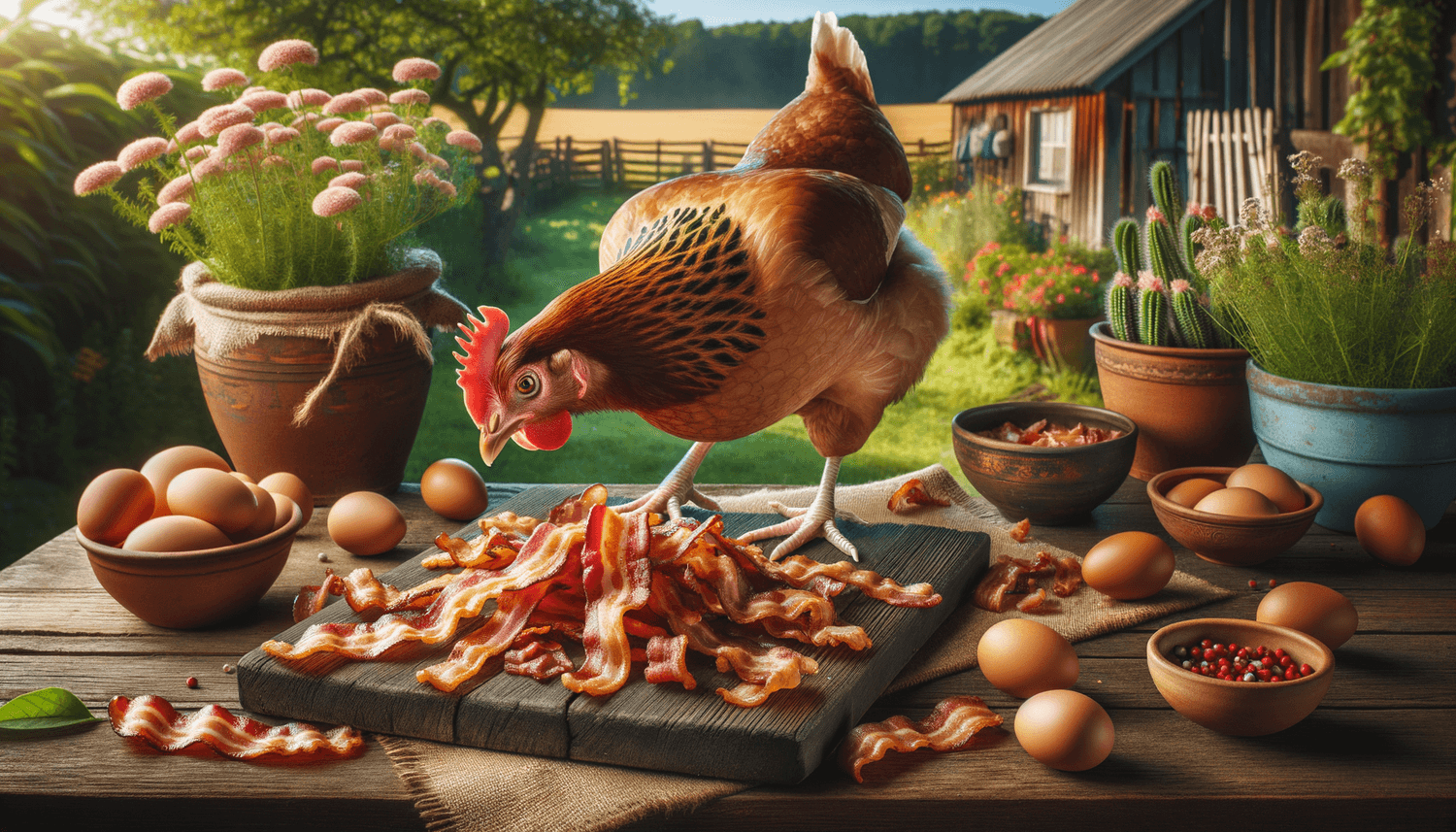Well, cluck cluck, fellow chicken enthusiasts! Let’s dive into the delicious and controversial world of bacon, as we explore whether our feathery friends can safely indulge in this savory treat. 🐔🥓 We’ll not only unscramble the facts about chickens noshing on bacon, but we’ll also discuss the importance of a balanced diet, the benefits and risks that may arise, and even the nutritional value this breakfast staple brings to the table. Plus, we’ll top it off with some helpful tips on how to prepare bacon-y goodness for your backyard flock. So, fluff up your feathers and settle in, because it’s time for a sizzling adventure!
Can chickens eat bacon?
Yes, chickens can eat bacon, but it is best to offer it only in moderation. While bacon contains some proteins and fats that are helpful for your chickens, it is also high in sodium, which can harm them if consumed excessively. So, serve small amounts of bacon occasionally and carefully observe your chickens to ensure they react well.
A balanced diet for happy chickens
Just like us humans, chickens flourish when they have a balanced diet catered to their specific needs. A nutritious and diverse selection ensures that our feathered friends receive all the essential vitamins, minerals, and nutrients they need for optimum health and well-being. Using a high-quality chicken feed as the foundation of their diet is crucial to achieve this balance.
A chicken’s diet should primarily consist of a high-quality chicken feed, which should make up around 80-90% of their diet. This provides the bulk of the necessary proteins, carbohydrates, vitamins, and minerals your backyard flock needs to thrive. The remaining 10-20% of their diet can consist of healthy treats, such as fruits and vegetables that not only add variety but also offer additional nutritional benefits. Remember, moderation is key, especially when it comes to treats!
Nutritional value of bacon for chickens.
Feeding bacon to chickens does have some nutritional benefits, although they should be weighed against its potential drawbacks before deciding to incorporate it into their diet. Bacon contains proteins, which are essential for chickens to build and maintain their muscles, feathers, and eggs. Additionally, bacon includes fats that can provide chickens with energy and contribute to their overall health condition.
However, there are a few reasons to be cautious when feeding bacon to chickens. Bacon is high in sodium, which, when consumed in excess, can harm chickens and even lead to health issues. Moreover, bacon often contains other additives like nitrates and preservatives, which are not ideal for your backyard flock’s well-being.
It is important to note that while bacon can provide some nutrition to chickens, it certainly should not be the main component of their diet. There are various other healthier, more nutrient-rich foods that chickens can enjoy without the risks associated with bacon. So, if you decide to treat your chickens with bacon, do so sparingly and monitor their reaction to ensure they can tolerate this indulgence without any negative effects.
Nutrition table of bacon for chickens.
| Information | Description |
|---|---|
| Nutritional Value | Contains proteins and fats, but also high in sodium and preservatives. |
| Suggested Serving Size | Small amounts, offered occasionally as a treat. |
| Safe Feeding Practices | Monitor chickens’ reactions during and after consumption to ensure no negative effects. |
| Preparation | Cut bacon into small pieces, preferably cooked and drained of excess fat. |
| Potential Risks | Excess sodium intake, exposure to nitrates and other additives. |
| Hydration | Ensure chickens have access to fresh water, as bacon may increase their thirst. |
| Digestion | Chickens may find it more challenging to digest large amounts of bacon. |
| Seasonal Availability | Bacon is available year-round, so it can be offered anytime as a treat. |
| Other Benefits | Can provide a fun and enjoyable treat for chickens when fed in moderation. |
Prepping bacon for your feathered friends
When treating your chickens to a little bit of bacon, it is important to ensure it is properly prepared to avoid any potential issues. Cooking the bacon thoroughly and draining the excess fat is highly recommended, as raw or overly greasy bacon may be harder for chickens to digest. Additionally, cut the bacon into small, manageable pieces which makes it easier for your chickens to peck and enjoy safely.
A world of delectable treats
While bacon can be a fun and enjoyable treat for your chickens, it is worth exploring other healthy options too. Chickens absolutely love fruits and vegetables; offering them crunchy delights like cut-up cucumbers, bell peppers, lettuce, or berries can add both nutrition and variety to their diet. Other options include mealworms, which are packed with protein and often considered a favorite amongst backyard flocks, or even scrambled eggs, which provide an excellent source of nutrients for your birds.
Monitoring your flock’s health
Feeding your chickens a variety of treats allows you to observe their preferences and how they respond to different foods. It is essential to keep an eye on the general health of your flock, including their weight, energy levels, and overall happiness. In case you notice any negative reactions or changes after consuming a particular food item, including bacon, consult an avian veterinarian or a knowledgeable chicken expert for guidance. By doing so, you’re ensuring the well-being of your backyard flock while treating them to a rich and diverse diet.

















